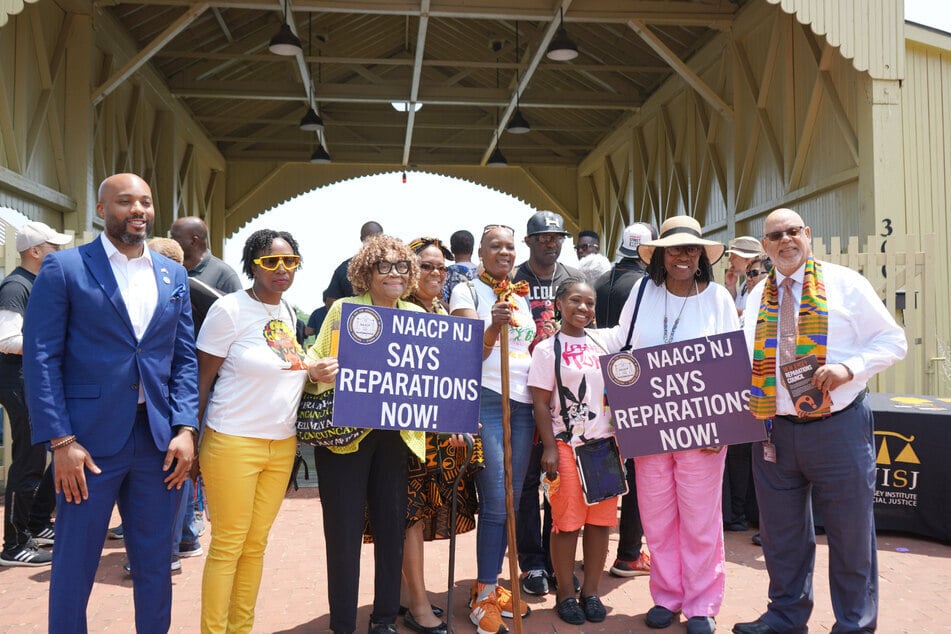New Jersey Reparations Council releases groundbreaking report and policy blueprint
Newark, New Jersey - On Juneteenth, the New Jersey Reparations Council (NJRC) released its groundbreaking final report and recommendations after two years of research and public testimony.

"Slavery was not just a sin of the south. It flourished in the north, growing some of its deepest roots in New Jersey," the report opens.
Entitled For Such a Time as This: The Nowness of Reparations for Black People in New Jersey, the report charts a path forward after generations of enslavement, Jim Crow apartheid, and ongoing discrimination, which have resulted in the state's staggering $643,000 Black-white racial wealth gap.
The 244-page blueprint is the result of two years of intensive study by the NJRC, launched in 2023 by the New Jersey Institute for Social Justice (NJISJ).
New Jersey urged to "repair harm and live up to its ideals"
The NJRC was composed of nine committees:
- History of Slavery in New Jersey
- Public Education and Narrative
- Economic Justice
- Segregation in New Jersey
- Democracy
- Public Safety and Justice
- Health Equity
- Environmental Justice
- Faith and Black Resistance.
Members held public hearings on each of those topics.
The report's release came as people around the nation marked Juneteenth amid a backsliding on civil rights and racial equity under Donald Trump.
"In the turbulence of today lies an opportunity to build something new – a new New Jersey where Black people are truly free and empowered to flourish and where all residents benefit from our state's wealth and opportunity," NJISJ President and CEO Ryan Haygood said.
"Our vulnerability to this moment is partially a result of never having confronted unresolved racial oppression – in the United States and New Jersey," Haygood continued. "This report will serve as a blueprint for New Jersey to finally repair that harm and live up to its ideals – to be a state of true equity where Black people and all of us can flourish."
What's in the New Jersey Reparations Council report?

After detailing the history of racial discrimination in New Jersey, the NJRC calls for direct financial payments to people who descend from Black people enslaved in the Garden State, as well as to redress post-slavery harms and to close the racial wealth gap.
"First, because slavery harmed both enslaved and free Black people, and because segregation and institutional racism have harmed descendants of enslaved people as well as Black people who arrived in New Jersey well after slavery, all Black people in New Jersey are eligible for reparations," the report states.
Among the myriad proposals in its comprehensive policy blueprint, the NRJC also recommends the state:
- Enact a Baby Bonds program
- Close the Thirteenth Amendment's loophole for involuntary servitude in New Jersey
- Restore the right to vote to incarcerated people
- Increase the state minimum wage and establish a guaranteed income for all residents
- Ensure universal health coverage
- Establish a reparative homeownership program to address the legacies of racially restrictive covenants and redlining
- Institute a scholarship fund and trust for Black students in higher education, and end legacy and donor preferences in admissions
- Remove traffic enforcement from local and state police responsibilities and end qualified immunity for officers
- Expand the memorialization and cultural preservation of New Jersey's Black history
- Create an electoral system that encourages and sustains the development of multiple political parties
The NJRC additionally calls for a constitutional amendment to empower the state legislature to enact race-conscious remedies, and for the creation of a Reparations Bureau to oversee and manage reparations initiatives.
NJRC Co-chair Khalil Gibran Muhammad said, "This report is a siren call for us to see ourselves clearly and pave the way to finally repairing the harm. Now it's up to all of us to meet the moment and embrace this opportunity."
Cover photo: TAG24/Rey Harris
